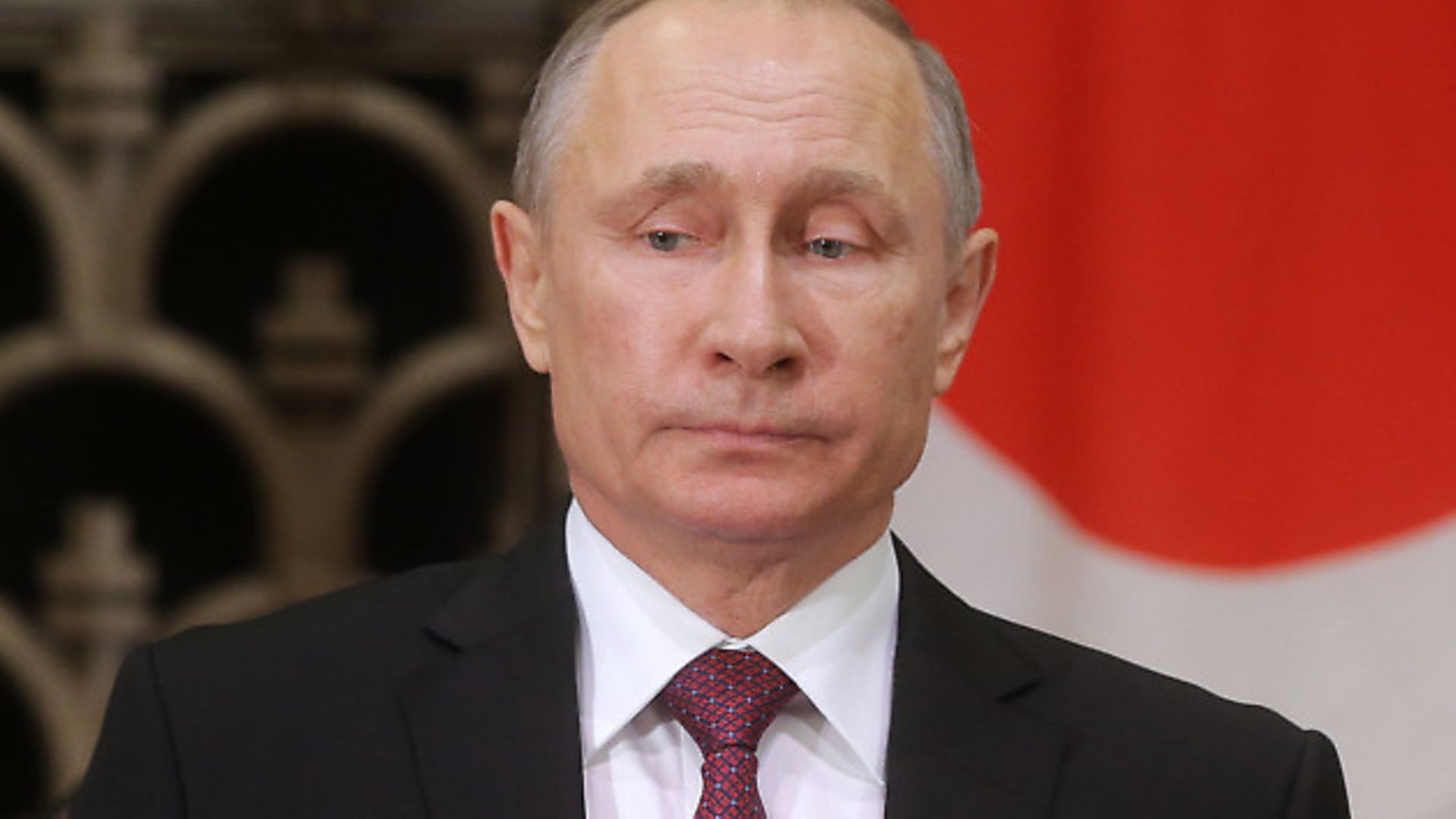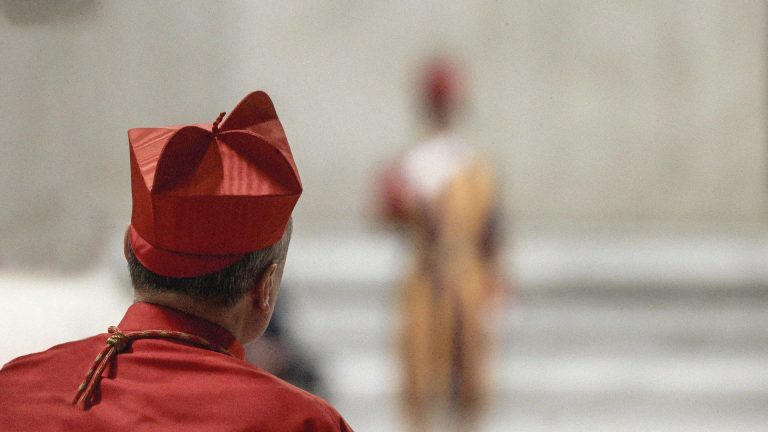
Vladimir Putin’s hand is not as strong as it looks, and there is plenty his opponents can do to counter him
President Obama has vowed to retaliate against Russia for its interference in the US election. As the Kremlin’s next target, Europe must support Obama in this endeavour and continue to counter Russia after he leaves office. Fortunately, there are plenty of measures that can be taken because Russia is weaker than it is often portrayed.
I recognise that detailing Russia and Putin’s nefarious deeds can make them seem more powerful than they really are. However deviously he is playing it, Putin has a weak hand. Russia is struggling with the ongoing effects of a shrinking population and corrupt, dysfunctional governance. Its collapsing economy is hopelessly dependent on natural resource exports. And its military budget is less than a tenth of NATO’s.
Rather than strength, Putin’s belligerence is rooted in the intense feeling of powerlessness he experienced as a junior KGB officer in Dresden at the end of the Cold War and his inferiority complex about Russia being marginalised ever since.
In reality, the UN Security Council seat and nuclear weapons Russia inherited from the Soviet superpower have consistently garnered it more attention from the rest of the world than a country of its otherwise reduced means would usually warrant. But perception does matter. The post-Soviet sense of being sidelined is held by significant numbers of Russians and Putin has stirred it up further to boost his support. In the long run, ways need to be found to change this misconception. But the short-term priority must be preventing Putin from wreaking more havoc upon the world.
Vendettas are part of Putin’s make-up as a mix of KGB man and mafia-style boss. He epitomises the prevailing ‘zero-sum’ mindset in Russian government circles. Most countries see a mutual benefit in their neighbours and the wider world being prosperous and peaceful. But for Putin, Russia can only be successful if others suffer and fail.
This mentality explains why Russia inflicted a war on its closest neighbour, Ukraine. The primary Russian objective for creating this conflict is to punish the Ukrainian people by destabilising their country indefinitely for refusing to do as they were told by the Kremlin. The example it sets is intended to deter others – not least in Russia itself – from defying Putin.
Putin will be feeling smug about the events of 2016. The US intelligence agencies are certain the Kremlin’s presidential election hacking assisted Moscow’s preferred candidate, Donald Trump. It may well have been sufficient to swing the 77,000 crucial votes in Michigan, Pennsylvania and Wisconsin that clinched the election.
Hillary Clinton is right that Putin’s additional motivation was the grudge he holds against her for criticising his own farcically rigged 2011 election. Putin was terrified by the protests against him in Russia, sparked by his brazen electoral fraud. After all, the stakes are high for him – surrendering power would not just mean losing the Russian presidency, it could mean losing his liberty and fortune too.
Russia’s barbaric intervention in Syria is driven by the need to distract domestic attention from Putin’s misrule and satisfy Russian hankerings for a return to global significance. The state-controlled media does not, of course, show the Russian people the sickening bombing of civilians, hospitals and aid convoys that has been used to bring this Russian resurgence about.
Those of us who value European unity have a substantial incentive for deterring Russia. This unity has already been undermined by the refugee crisis that Russia’s actions in Syria aggravated, and, most of all, the rise of the far-right populists Putin frequently supports. There will be more to come in 2017, as Russia strives to sow further division in Europe and seeks to manipulate the crucial French and German elections.
Various options are available to target Russia’s weaknesses.
Whilst the Russians are clearly adept at cyber warfare (although not adept enough to avoid being caught at it), the Americans and their allies have an ample capability too. Evidence of this was provided by the Stuxnet virus deployed in 2009/10 to disrupt Iran’s nuclear programme. Such techniques are utilised sparingly because they can rarely be reused. But Russia’s actions have clearly reached the point where a response in kind would be worthwhile. Russia does not have any democracy to disrupt. But a strike against its vital oil and gas infrastructure would cause it to doubt whether more cyber warfare is in its interests.
More conventionally, NATO has successfully protected its member states for 67 years through commitments to mutual defence and strong deterrence against aggressors. It should stick to these principles. One of the more ludicrous justifications advanced by Russia for its recent behaviour is that ‘NATO made us do it’ by allowing countries it once dominated to join.
In fact, Russia’s actions merely demonstrate why the democracies of eastern and central Europe were so keen to join NATO. More forces should be posted to the countries most menaced by Russia. This would make clear that they will be defended and send the message that Russia’s current policies will bring NATO closer to its borders, not drive it away.
Whilst the Russian regime has had no qualms about bombing defenceless children in Aleppo, it will not pick a fight with an adversary ten times its size in military terms, once it has been made clear that a fight is what it would get.
Opposition leader Alexei Navalny aptly describes the ruling clique in Russia as ‘the party of crooks and thieves’. Bizarrely, Putin, the gang’s first among equals, pretends to be above joining the gluttons over whom he presides at the trough. The Panama Papers dented this fiction, but some Russians still believe him. Western intelligence agencies may have other evidence of the billions Putin is believed to have stashed away in investments managed by his cronies. As economic hardship increases in Russia because of Putin’s actions, now might be a good time to put this information into the public domain.
The sanctions imposed on the Russians after their invasion of Ukraine have had some restraining impact on them. Stricter ones directly targeting Putin, his inner circle and the oligarchs who prop up his rule should now be implemented. Full use should be made of the available laws on freezing and seizing assets in Europe that the beneficiaries cannot prove were legitimately acquired.
Many senior Russian officials and oligarchs have a well-publicised penchant for life in glamourous parts of Europe such as London and the south of France. More stringent travel bans against these individuals and their families would have them questioning whether Putin’s policies are really working for them anymore and if it might be time for a change.
Europeans could also lead a campaign to move the 2018 football World Cup from Russia and deny Putin the propaganda coup he intends it to provide.
Ultimately, ensuring our security depends significantly upon getting our own house in order. Trump’s desire for Europe to do more for its own defence is new only in the clumsy way he expressed it in public. And we need to be a whole lot less welcoming of dodgy Russian money and the bearers of it.
Even after the appalling murder of the Russian Ambassador to Turkey, Andrei Karlov, Europeans should not be misled into thinking we are somehow on the same side as Russia and should work with them. The Putin regime sees its relationship with Europe and the West as being one of rivalry. They will continue to pose an active threat to our democracy and security. It would be wishful – and dangerous – thinking for us to believe otherwise.
Putin’s present smugness will not last for ever. Hubris comes before a fall and Putin will fall one day. Corrupt, brutal dictators like him invariably do and rarely in ways that are pleasant for them. Until that day comes, Europe must protect itself from the malign machinations of the Kremlin. And if doing so helps to bring that day forward, then so much the better.
Paul Knott is a former British diplomat and author of The Accidental Diploma









